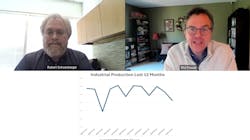Indiana Economist: Plan for Years of 'Prosperous Growth’
Pointing to a worker productivity boom and a return to a more traditional pattern of growth, the executive director of the Indiana Business Research Center said the U.S. economy looks set to put up several more good years—and sees the industrial sector as very well positioned to play a major role.
“Fundamentally, 2025 looks really good and I would plan accordingly if I was running a manufacturing organization,” Phil Powell, who also is an associate clinical professor of business economics at Indiana University’s Kelley School of Business.
Speaking on an IndustryWeek webinar Nov. 20, Powell said he was surprised this year at how many companies appeared to put off major investments until they had clarity about the recent presidential election. That there’s certainty now is a good thing and Powell added that he’s hopeful more people will now begin to see the economy’s recent overall strength more clearly.
“Interest rates are coming down—not as fast as we’d like—and productivity is going up, which increases your margins […] And if regulations come down, that reduces your fixed costs,” Powell said. “Your default plan should be for another two or three or four years of prosperous growth.”
To watch the full conversation between Powell and IndustryWeek Editor-in-Chief Robert Schoenberger, click here. The chat also discussed supply-chain risks being tracked by Zach Zacharia of Lehigh University and the need for business and government leaders to invest more in workforce development.
Powell’s positive prognostication echoes the outlook veteran economist Hugh Johnson delivered at a late-September event hosted by accounting firm UHY. Noting that financial markets suggest more good things ahead for the economy through 2026, Johnson said manufacturing is poised to outgrow the broader economy. He forecast that industrial firms will hire a net of 103,000 people next year and another 150,000 in 2026.
Powell is calling for a similar path for the job market. The unemployment rate, he said, might rise to 4.5% in early 2025 but then begin to fall again as the economy returns to a normal growth path, having finally shaken the last of the pandemic’s aftershocks. Key to that will be business leaders paying greater attention to longer-term trends that bode well for U.S. manufacturing. Among them: A shift to deglobalization and the rise of technologies that are boosting productivity and reducing the importance of labor in location decisions.
“I invite every organization to do a gut check and make sure you’re not still making decisions based on a COVID mindset,” Powell said. “There’s every reason to be optimistic long term […] Good businesses take calculated risks. Now is the time to take those calculated risks and make those investments.”
It appears some business leaders are starting to heed that call already:
- The latest Plastics Industry Association report on machinery shipments showed that seven out of 10 respondents expect 2025 to be better than this year. In addition, a growing number of equipment manufacturers are seeing more quoting activity.
- Similarly, U.S. machine tool orders have (finally) begun trending up: September’s order value was 24% higher than August’s and nearly 15% higher than 12 months prior.
- And to Powell’s point about optimism versus caution: Nearly 60% of respondents to a recent survey by Endeavor Business Intelligence, the research division of IndustryWeek parent company Endeavor Business Media, said they are optimistic about the economy in the first year of the second Trump administration. A similar number also is at least somewhat confident in the Trump team’s economic approach.
About the Author
Geert De Lombaerde
Senior Editor
A native of Belgium, Geert De Lombaerde has been in business journalism since the mid-1990s and writes about public companies, markets and economic trends for Endeavor Business Media publications, focusing on IndustryWeek, FleetOwner, Oil & Gas Journal, T&D World and Healthcare Innovation. He also curates the twice-monthly Market Moves Strategy newsletter that showcases Endeavor stories on strategy, leadership and investment and contributes to other Market Moves newsletters.
With a degree in journalism from the University of Missouri, he began his reporting career at the Business Courier in Cincinnati in 1997, initially covering retail and the courts before shifting to banking, insurance and investing. He later was managing editor and editor of the Nashville Business Journal before being named editor of the Nashville Post in early 2008. He led a team that helped grow the Post's online traffic more than fivefold before joining Endeavor in September 2021.
